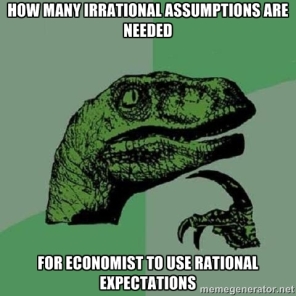Uncertainty, learning, and rational expectations
3 Dec, 2024 at 10:06 | Posted in Economics | 2 Comments
 The rational expectations hypothesis presupposes — basically for reasons of consistency — that agents have complete knowledge of all of the relevant probability distribution functions. When trying to incorporate learning in these models — trying to take the heat of some of the criticism launched against it up to date — it is always a very restricted kind of learning that is considered. A learning where truly unanticipated, surprising, new things never take place, but only rather mechanical updatings — increasing the precision of already existing information sets — of existing probability functions.
The rational expectations hypothesis presupposes — basically for reasons of consistency — that agents have complete knowledge of all of the relevant probability distribution functions. When trying to incorporate learning in these models — trying to take the heat of some of the criticism launched against it up to date — it is always a very restricted kind of learning that is considered. A learning where truly unanticipated, surprising, new things never take place, but only rather mechanical updatings — increasing the precision of already existing information sets — of existing probability functions.
Nothing really new happens in these ergodic models, where the statistical representation of learning and information is nothing more than a caricature of what takes place in the real world target system. This follows from taking for granted that people’s decisions can be portrayed as based on an existing probability distribution, which by definition implies the knowledge of every possible event (otherwise it is in a strict mathematical-statistically sense not really a probability distribution) that can be thought of taking place.
But in the real world it is — as shown again and again by behavioural and experimental economics — common to mistake a conditional distribution for a probability distribution. Mistakes are impossible to make in the kinds of economic analysis — built on the rational expectations hypothesis — that mainstream economists are such adamant propagators for. On average rational expectations agents are always correct. But truly new information will not only reduce the estimation error but actually change the entire estimation and hence possibly the decisions made. To be truly new, information has to be unexpected. If not, it would simply be inferred from the already existing information set.
In rational expectations models new information is typically presented as something only reducing the variance of the parameter estimated. But if new information means truly new information it actually could increase our uncertainty and variance (information set (A, B) => (A, B, C)).
Truly new information gives birth to new probabilities, revised plans and decisions – something the rational expectations hypothesis cannot account for with its finite sampling representation of incomplete information.
In the world of rational expectations, learning is like being better and better at reciting the complete works of Shakespeare by heart — or at hitting the bull’s eye when playing dart. It presupposes that we have a complete list of the possible states of the world and that by definition mistakes are non-systematic (which, strictly seen, follows from the assumption of ‘subjective’ probability distributions being equal to the ‘objective’ probability distribution). This is a rather uninteresting and trivial kind of learning. It is a closed world learning, synonymous with improving one’s adaptation to a world which is fundamentally unchanging. But in real, open world situations, learning is more often about adapting and trying to cope with genuinely new phenomena.
The rational expectations hypothesis presumes consistent behaviour, where expectations do not display any persistent errors. In the world of rational expectations, we are always, on average, hitting the bull’s eye. In the more realistic, open systems view, there is always the possibility (danger) of making mistakes that may turn out to be systematic. It is because of this, presumably, that we put so much emphasis on learning in our modern knowledge societies.